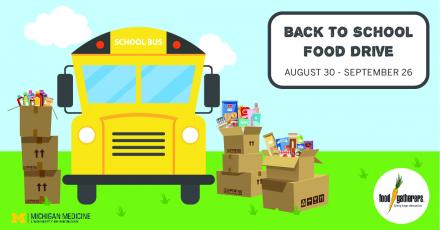As children return to school, and the Delta variant of coronavirus threatens to disrupt many lives across Michigan, the need for a stable source of food has once again grown urgent for tens of thousands of people in the communities surrounding the University of Michigan.
That’s why Michigan Medicine, U-M’s academic medical center, has launched a month-long effort to collect food and toiletries, and money to buy such supplies, for Food Gatherers. It’s the fourth in a series of drives begun in March 2020 that has already collected more than 242,000 meals’ worth of donations.
The drive will be ongoing through September 26 and is open to all U-M faculty, staff and students, and members of the community who are in a position to give.
Donors may give online via credit card, or get information about giving by mail or phone, at foodgatherers.org/um.
Or, donors may drive up to drop off food and toiletries at Dock 90 of U-M’s North Campus Research Complex, at 2800 Plymouth Road in Ann Arbor, just off Huron Parkway. Donations can be left between 8 a.m. and 5 p.m. weekdays, and 9 a.m. and 2 p.m. weekends except for Labor Day weekend. Volunteers from across Michigan Medicine will be available to help unload donations between 10 a.m. and 2 p.m. weekdays, and 11 a.m. to 2 p.m. weekends.
“Access to a consistent source of healthy food is essential to each child’s ability to learn, and to the overall health of families and community,” says Tony Denton, senior vice president and chief operating officer for University of Michigan Health. “The prolonged pandemic has revealed significant food insecurity and other gaps in basic needs, leading to record-high demands for food, diapers and other basic supplies. Those of us with the capacity to give are asked to help meet these needs, supporting learning, growth, health and wellness.”
“Food supply is a known social determinant of health, and our clinicians know how much it can affect a patient’s overall outcomes,” says David Miller, M.D., president of University of Michigan Health. “We who are fortunate enough to have weathered this pandemic must do what we can to support those who are still struggling.”
More about the growing need for help
Michigan Medicine’s 2020 spring, summer and winter food and toiletry drives gathered more than 49,200 pounds of food and nearly 3,300 pounds of toiletries for Food Gatherers.
As the pandemic enters its 19th month, Food Gatherers is still experiencing a rising demand for supplies from the 170 local organizations it serves.
In fact, the agency distributed more than 9 million pounds of food in the fiscal year that ended June 30, 14.5% more than it distributed the year before including the first four months of the pandemic.
Forty percent of the people seeking help from the agencies that Food Gatherers supports had never sought food assistance before.
One of the agencies that benefits from Food Gatherers is the Ann Arbor Meals on Wheels program, which is part of Michigan Medicine, serving hundreds of older adults with home-delivered meals and supplies. AAMOW buys items at low cost through Food Gatherers.
More about donating:
- Cash donations give Food Gatherers the most flexibility, including buying in bulk at reduced prices. Every dollar donated can buy three meals thanks to the organization’s purchasing strategy.
- Donors should not bring cash or gift cards to the drive-up location.
- For the drop-off donation site, donors are asked to avoid giving items that are perishable (fresh or frozen), expired, already opened or packed in glass.
- Gardeners with extra produce to give, and those with perishable items to donate, may bring them to the Food Gatherers headquarters at 1 Carrot Way, Ann Arbor. More information is available here.
- PPE for Michigan Medicine is not needed at this time.
Most-needed items:
(low/no sodium canned food and foods made from whole grains are preferred)
-
Hearty soups (beef stew, chili, etc.)
-
Canned meats (tuna fish, chicken, etc.)
-
Canned vegetables
-
Packaged pasta & rice
-
Whole grain cereal & oatmeal
-
Baking & cooking supplies (flour, sugar, oil, etc.)
-
Condiments
-
Nut butters or jelly
-
Kid-friendly snacks (granola bars, goldfish, etc.)
-
Baby food & formula
-
Ensure & other nutritional supplement drinks
-
Baby items (diapers, wipes, etc.)
-
Soap & shampoo
-
Toothpaste & toothbrushes
-
Disposable razors

